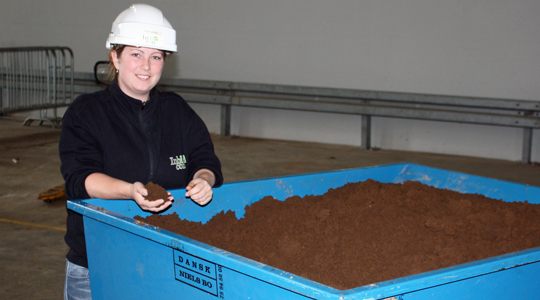Kit Kellebjerg Mogensen, MSc in Engineering (Chemistry and Biotechnology) is employed at the development and research department at Inbicon, a Dong Energy subsidiary. Here she researches in second generation bioethanol, which is a CO2 neutral fuel extracted from agricultural leftovers.

‘I am part of a team of specialists who all focus on the optimisation of Inbicon processes. Personally, I am a specialist in pre-treatment and carry out tests at our pilot plant in Skærbæk. Here it is my job to plan the tests in relation to raw materials and settings,’ says Kit and continues:
‘At the moment we are testing wheat straw but we have also worked with e.g. corn, bagasse and EFB which is a residual product from palm oil. In fact, we have just sold an EFB pilot plant to Japan’.
From small-scale to large-scale
Kit has helped transfer the results from the pilot plant to Inbicon’s demonstration plant in Kalundborg, where they can process four tons of biomass an hour. That makes it one of the world’s largest plants.
‘As a student I learned about the difficulties of upgrading processes. Therefore it is exciting to follow the process from flask scale where we operate with between 100 grams and 10 kilo in batch processes for the pilot plant which can process up to 100 kilo an hour to the bigger plant where we process 1000 kilo an hour and finally to the big demonstration plant’, she says.
Engineering degree provides a holistic understanding
‘I am also responsible for the analysis of the pilot tests; hence I spend a lot of time at the laboratory. I like the variation of working at the plants and inside the laboratory where I help develop new methods of analysis for the large scale projects. That way, things are connected and I get an exciting and varied workday’.
As a chemical engineer Kit can both calculate mass and energy balances and see the bigger perspective:
‘I am glad to be an engineer because it allows me to carry out research work as well as to use the knowledge I achieve in the practical upgrading work’, she says and adds:
‘It is exciting to help produce the bioethanol, which is added to petrol in Denmark today, in the most efficient way’.
Facts
To get a master degree in Chemistry and Biotechnology you study for 2 years on top of a 3 years bachelor degree.
At the master programme you choose one of four academic profiles:
- Biorefining
- Functional Materials
- Chemical Technology
- Organic Synthesis and Catalysis